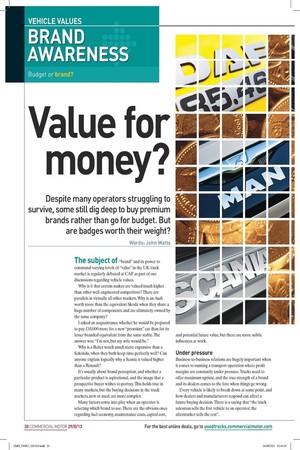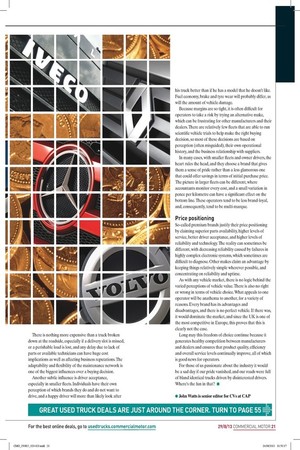VEHICLE VALUES BRAND AWARENESS Budget or Value for
Page 16

Page 17

If you've noticed an error in this article please click here to report it so we can fix it.
money?
Despite many operators struggling to survive, some still dig deep to buy premium brands rather than go for budget. But are badges worth their weight? Words: John Watts
The subject of "brand" and its power to command varying levels of "value" in the UK truck market is regularly debated at CAP as part of our discussions regarding vehicle values.
Why is it that certain makes are valued much higher than other well-engineered competitors? There are parallels in virtually all other markets. Why is an Audi worth more than the equivalent Skoda when they share a huge number of components and are ultimately owned by the same company?
I asked an acquaintance whether he would be prepared to pay £10,000 more for a new "premium" car than for its lesser branded equivalent from the same stable. The answer was: "I'm not, but my wife would be."
Why is a Rolex watch much more expensive than a Sekonda, when they both keep time perfectly well? Can anyone explain logically why a Scania is valued higher than a Renault?
It's usually about brand perception, and whether a particular product is aspirational, and the image that a prospective buyer wishes to portray. This holds true in many markets, but the buying decisions in the truck markets, new or used, are more complex. Many factors come into play when an operator is selecting which brand to use. There are the obvious ones regarding fuel economy, maintenance costs, capital cost,
and potential future value, but there are more subtle influences at work. Under pressure
Business-to-business relations are hugely important when it comes to running a transport operation where profit margins are constantly under pressure. Trucks need to offer maximum uptime, and the true strength of a brand and its dealers comes to the fore when things go wrong.
Every vehicle is likely to break down at some point, and how dealers and manufacturers respond can affect a future buying decision. There is a saying that "the truck salesman sells the first vehicle to an operator; the aftermarket sells the rest".
There is nothing more expensive than a truck broken down at the roadside, especially if a delivery slot is missed, or a perishable load is lost, and any delay due to lack of parts or available technicians can have huge cost implications as well as affecting business reputations. The adaptability and flexibility of the maintenance network is one of the biggest influences over a buying decision. Another subtle influence is driver acceptance, especially in smaller fleets. Individuals have their own perception of which brands they do and do not want to drive, and a happy driver will more than likely look after
his truck better than if he has a model that he doesn't like. Fuel economy, brake and tyre wear will probably differ, as will the amount of vehicle damage.
Because margins are so tight, it is often difficult for operators to take a risk by trying an alternative make, which can be frustrating for other manufacturers and their dealers. There are relatively few fleets that are able to run scientific vehicle trials to help make the right buying decision, so most of these decisions are based on perception (often misguided), their own operational history, and the business relationship with suppliers.
In many cases, with smaller fleets and owner drivers, the heart rules the head, and they choose a brand that gives them a sense of pride rather than a less glamorous one that could offer savings in terms of initial purchase price. The picture in larger fleets can be different, where accountants monitor every cost, and a small variation in pence per kilometre can have a significant effect on the bottom line. These operators tend to be less brand-loyal, and, consequently, tend to be multi-marque. Price positioning
So-called premium brands justify their price positioning by claiming superior parts availability, higher levels of service, better driver acceptance, and higher levels of reliability and technology. The reality can sometimes be different, with decreasing reliability caused by failures in highly complex electronic systems, which sometimes are difficult to diagnose. Other makes claim an advantage by keeping things relatively simple wherever possible, and concentrating on reliability and uptime.
As with any vehicle market, there is no logic behind the varied perceptions of vehicle value. There is also no right or wrong in terms of vehicle choice. What appeals to one operator will be anathema to another, for a variety of reasons. Every brand has its advantages and disadvantages, and there is no perfect vehicle. If there was, it would dominate the market, and since the UK is one of the most competitive in Europe, this proves that this is clearly not the case.
Long may this freedom of choice continue because it generates healthy competition between manufacturers and dealers and ensures that product quality, efficiency and overall service levels continually improve, all of which is good news for operators. For those of us passionate about the industry it would be a sad day if our pride vanished, and our roads were full of bland identical trucks driven by disinterested drivers. Where's the fun in that? • • John Watts is senior editor for CVs at CAP













































